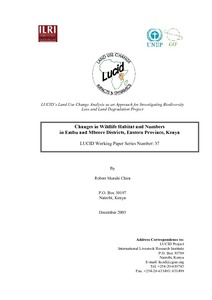Search results
Showing items 1 through 9 of 40.-
Library ResourceReports & ResearchDecember, 2003
-
Library ResourceJournal Articles & BooksJanuary, 2004Africa, Kenya, Mali
Agricultural growth will prove essential for improving the welfare of the vast majority of Africa’s poor. Roughly 80 percent of the continent’s poor live in rural areas, and even those who do not will depend heavily on increasing agricultural productivity to lift them out of poverty. Seventy percent of all Africans— and nearly 90 percent of the poor—work primarily in agriculture. As consumers, all of Africa’s poor—both urban and rural—count heavily on the efficiency of the continent’s farmers.
-
Library ResourceReports & ResearchDecember, 2003Kenya, Africa, Eastern Africa
-
Library ResourceConference Papers & ReportsDecember, 2003Southern Africa, Africa
The objectives of the conference were threefold. First, to determine the need for a regional approach to EA in southern Africa. Second, to determine the best way of accounting for trans-boundary and cumulative impacts in the region.
-
Library ResourceReports & ResearchDecember, 2003Kenya, Africa, Eastern Africa
-
Library ResourceTraining Resources & ToolsDecember, 2003
-
Library ResourceJournal Articles & BooksDecember, 2003
The U.S. Army is responsible for preparing a well-trained combat force while maintaining the ecological diversity and integrity of the lands it manages. The ability to efficiently collect data that accurately capture plant community diversity and percent composition is imperative to proper monitoring and land management of military lands. To ensure that the dual goals of military training and land stewardship are met on an army-wide basis, the U.S. Army Land Condition-Trend Analysis (LCTA) Program was developed.
-
Library ResourceReports & ResearchDecember, 2003Kenya, Africa, Eastern Africa
-
Library ResourceJournal Articles & BooksDecember, 2003Ethiopia
Expert judgements are potentially a valuable source of information in land degradation assessment, especially in areas where data paucity impedes the use of quantitative models. However, expert opinions are also much disputed because they are not tested for consistency, abstain from formal documentation, while their quantitative interpretation is inherently unidentifiable. This paper evaluates and formalizes the use of expert judgements to conduct a nationwide water erosion hazard assessment in Ethiopia.
-
Library ResourceJournal Articles & BooksDecember, 2003Syrian Arab Republic, Italy, Asia
gricultural biodiversity in FAO FAO’s goal is to alleviate poverty and hunger by promoting sustainable agricultural development, improved nutrition and food security – the access of all people at all times to the food they need for an active and healthy life. The importance of biological diversity for food security and sustainable agriculture has been recognized by FAO and the Organization is working to promote its conservation and sustainable use in an agricultural context.
Land Library Search
Through our robust search engine, you can search for any item of the over 64,800 highly curated resources in the Land Library.
If you would like to find an overview of what is possible, feel free to peruse the Search Guide.








